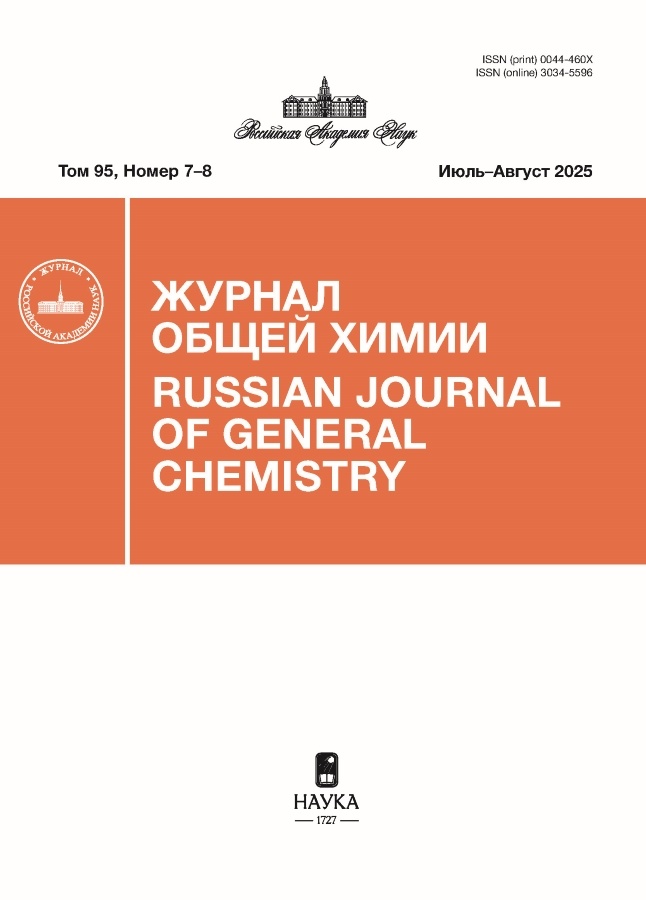Том 94, № 6 (2024)
Статьи
Получение, реакции и применение 2,2-диметил-4-оксиметил-1,3-диоксолана (обзор)
Аннотация
В обзоре проанализированы публикации, в которых приводятся результаты исследований современных и традиционных подходов к синтезу 2,2-диметил-4-оксиметил-1,3-диоксолана, а также данные по методам его использования в органическом синтезе. Показаны пути получения энантиомерно чистых 2,2-диметил-4-оксиметил-1,3-диоксоланов, необходимых в производстве лекарственных препаратов. Представлены данные о применении 2,2-диметил-4-оксиметил-1,3-диоксолана в фармацевтической, медицинской и нефтехимии.
 664-690
664-690


Аддукты Дильса–Альдера N-замещенных 2-пиридонов с малеинимидами. Синтез и противовирусная активность
Аннотация
В термических условиях реакции Дильса–Альдера с выходами от 68 до 97% синтезированы аддукты N-замещенных 2-пиридонов [пиридин-2(1H)-онов] и N-замещенных имидов малеиновой кислоты. Цитотоксичность и противовирусная активность полученных соединений изучены на модели аденовирусной инфекции [аденовирус человека 5 типа (AdV5)] в культуре клеток MA-104. Показано, что синтезированные аддукты обладают низкой токсичностью и невысокой противовирусной активностью. Наиболее выраженными вирусингибирующими свойствами обладает соединение 9-гексил-2-фенил-3a,4,7,7a-тетрагидро-1H-4,7-(эпиминометано)изоиндол-1,3,8-трион с индексом селективности, равным 7.
 691-698
691-698


Синтез и строение этил-4-арил-2-оксо-2,3,4,10-тетрагидробензо[4,5]имидазо[1,2-a]пиримидин-3-карбоксилатов
Аннотация
Этил-4-арил-2-оксо-2,3,4,10-тетрагидробензо[4,5]имидазо[1,2-a]пиримидин-3-карбоксилаты получены трехкомпонентной конденсацией диэтилмалоната, ароматического альдегида, 2-аминобензимидазола в этаноле в присутствии пиперидина. Структура полученных соединений установлена методами ЯМР 1Н, 13С спектроскопии и рентгеноструктурного анализа.
 699-704
699-704


Особенности взаимодействия орто-карбораниллития с 3,6-бис(3,5-диметил-1H-пиразол-1-ил)-1,2,4,5-тетразином
Аннотация
Действие генерированного in situ орто-карбораниллития на 3,6-бис(3,5-диметил-1H-пиразол-1-ил)-1,2,4,5-тетразин приводит к образованию бис(орто-карборанил)диформилгидразида как продукта раскрытия 1,2,4,5-тетразинового цикла с выделением молекулы азота, при этом ожидаемые продукты ипсо-замещения пиразольного фрагмента не обнаружены. Структура полученного симметричного бис(орто-карборанил)диформилгидразида установлена на основании данных спектроскопии ЯМР, масс-спектрометрии и ренгтеноструктурного анализа.
 705-711
705-711


Производные (–)-цитизина с тиомочевинным фрагментом. Синтез и противовирусная активность
Аннотация
Синтезированы новые производные хинолизидинового алкалоида (–)-цитизина с замещенным 2-пиридоновым ядром и тиомочевинным фрагментом в биспидиновой части молекулы. Проведена оценка способности синтезированных соединений (цитизинсодержащих тиомочевин) ингибировать репродукцию вируса парагриппа человека 3 типа. Установлено, что производные, полученные взаимодействием бензоил- или фенилизотиоцианата с (–)-цитизином, а также его 9-бром- или 9,11-производным, эффективно подавляют размножение вируса парагриппа человека 3 типа (их показатели селективности составляют 56, 58 и 95 соответственно), что подтверждает перспективность выбранного подхода к синтетическим модификациям алкалоида (–)-цитизина с целью получения на его основе эффективных противовирусных агентов.
 712-721
712-721


Синтез производных бетулоновой и бетулиновой кислот с сульфонамидным фрагментом, связанным с тритерпеноидом амидоалкановым спейсером
Аннотация
Синтезирована серия потенциально биологически активных сульфонамидов бетулоновой и бетулиновой кислот с сульфонамидным фрагментом, содержащим остатки дибутиламина или N-гетероциклов и связанным с тритерпеновой матрицей амидоэтановым или амидопропановым спейсером. Сульфонамиды бетулоновой кислоты получены хлорангидридной конъюгацией кислоты с 2-аминоэтан- или 3-аминопропансульфонамидами и использованы в качестве соединений предшественников для перехода к аналогичным производным бетулиновой кислоты путем селективного восстановления 3-кетогруппы действием NaBH4 в EtOH. Структура всех синтезированных тритерпеновых сульфонамидов подтверждена методами 1D и 2D ЯМР спектроскопии и масс-спектрометрии.
 722-733
722-733


Влияние производных аминофенола и аминокислот на уровень нитрозил-радикала и его активных форм in vitro
Аннотация
Изучено влияние аминофенола, аминокислот и их производных на уровень •NO и его активных форм (•NO2, N2O3) в водной аэробной среде (рН = 7.4) с использованием нитропруссида в качестве донора •NO. Установлено, что наибольшую NOx-акцепторную активность проявляют 3-аминофенол (IC50 = 0.11 мМ.), 2-аминофенол (IC50 = 0.195 мМ.) и 4,6-ди-трет-бутил-2-аминофенол (IC50 = 0.12 мМ.), стандарты – тролокс (IC50 = 0.19 мМ.) и аскорбат (IC50 = 4.88 мМ.). Метилирование по ОН-группе снижает эффективность аминофенола. В исследованном концентрационном диапазоне (0–75 мМ.) Tyr-Ala (IC50 = 5.0 мМ.) и β-Ala-His (IC50 = 35.0 мМ.) активнее, чем Phen-Ala (IC50 > 50 мМ.) и Gly-Gly (IC50 > 50 мМ.). Комплексы Cu(Gly)2 и Cu(Gly-Gly)2 при низких концентрациях (0.05–0.5 мМ.) в 1.4–1.8 раза эффективнее, чем Gly и Gly-Gly.
 734-745
734-745


Спектрофотометрический анализ сополиариленфталидов и их сополимеров с метилметакрилатом и стиролом
Аннотация
Фотометрическим методом исследованы сернокислотные растворы сополиариленфталидов дифенилоксидного ряда и их сополимеров с метилметакрилатом и стиролом. Согласно спектральным данным, вне зависимости от соотношения одиночных (α) и сдвоенных (β + γ) фталидных групп в макроцепях сополиариленфталидов в составе их сополимеров с метилметакрилатом на один моль фталидных звеньев приходится ~20–26 моль метилметакрилата. Структура сополиариленфталидов является определяющим фактором при формировании сополимеров со стиролом, в составе которых преобладают либо звенья стирола, либо фталидные фрагменты (~15–40 и ~2–5 моль стирола на 1 моль фталидного звена).
 746-756
746-756


Гетероядерные глицинатные комплексы Fe(II), Fe(III) и Сo(II), их модельные параметры
Аннотация
Методом окислительного потенциала Кларка–Никольского при температуре 298.15 K, ионной силе раствора [Na(H)CIO4] I = 1.0 моль/л изучена система Fe(II)–Fe(III)–Со(II)–Gly–H2O. Установлено формирование в системе моноядерных и гетероядерных соединений различного состава: [FeHL(H2O)5]3+, [Fe(HL)2(H2O)4]3+, [Fe(HL)(OH)(H2O)4]2+, [СoL(H2O)5]+, [FeIIIСoIIL(H2O)11]4+, [FeIIIСoII(L)2(H2O)10]3+, [FeL(H2O)5]+, [Fe(HL)2(H2O)4]2+, [Fe(HL)(OH)(H2O)4]+ и [Fe(HL)(OH)2(H2O)3]0. Методом итерации окислительной функции Юсупова рассчитаны устойчивость и модельные параметры координационных соединений, построены их диаграммы распределения координационных соединений. Установлено, что гетероядерный комплекс [FeIIIСoIIL(H2O)11]4+ является наиболее устойчивым, со степенью накопления 99.50%, существует до рН = 9.5.
 757-765
757-765


Влияние строения карбамоилметилфосфиноксидов на экстракцию лантанидов(III) из азотнокислых растворов в присутствии динонилнафталинсульфокислоты
Аннотация
Установлено, что экстракция лантанидов(III) из азотнокислых растворов растворами карбамоилметилфосфиноксидов значительно возрастает в присутствии динонилнафталинсульфокислоты. Определена стехиометрия экстрагируемых комплексов, рассмотрено влияние состава водной фазы, природы органического растворителя и структуры карбамоилметилфосфиноксидов на эффективность извлечения ионов металлов в органическую фазу.
 766-774
766-774


Термические и люминесцентные свойства разнолигандных комплексов европия(III) c пиразиновой кислотой
Аннотация
Синтезированы соединения Eu(III) с пиразиновой кислотой и дополнительными азот- и фосфорсодержащими нейтральными лигандами. Методами химического элементного, термического анализа и ИК спектроскопии установлен состав комплексов и способ координации карбоксилат-ионов. Выявлены наиболее термически устойчивые соединения. Изучены люминесцентные характеристики комплексных соединений. Установлено, что максимальная интенсивность люминесценции характерна для пиразината европия(III) с трифенилфосфиноксидом. Определено морфологическое строение и дисперсность комплексов.
 775-784
775-784













